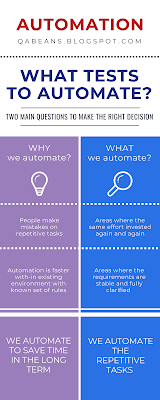Today I wanted to discuss the basic automation question - what exactly do we want to automate?
We can of course be extreme and say "everything" or "nothing" but both of those options are a very costly choices, first takes a lot of resources the other get you pay for it at the end.
We can of course be extreme and say "everything" or "nothing" but both of those options are a very costly choices, first takes a lot of resources the other get you pay for it at the end.
I was consulting a client once where they had a complex process of ROI calculation that resulted in them not automating anything as the process to choose what to automate was time consuming by itself and ironically enough was not part of the Return Of Investment formula.
With this client we had to find and streamline the process to make a quick and easy decision regarding the automation candidates and I wanted to share this process with you.
To better understand the process we will need to answer two simple questions - Why and What:
- Why we automate
- What we automate
Why we automate?
Imagine yourself in an epic competition Human against the Machine in a battle of hammering nails into the wood.
You prepare yourself by performing a set of complex stretches, warming your hands and feeling the weight of the hummer, the pure fresh air of a spring morning gives you the bust of energy that you need. While the other team of lab folks fine tuning the shining robot and adjusting the configurations before the start signal. Then the announcement coming in, but not a one that everyone expects.
"Instead of a long, straight, board with nails to hummer", says the voice through the loadspeaks "we decided to introduce a small change - the board will be snake shaped"
The crowed murmurs, the lab team scrambles in a frenetic panic and you smile to yourself.
Then the boards are being replaced to a super long snake shaped boards with hundred of nails to hummer that will probably take you hours to finish and the gong announces the beginning of the competition.
You are jumping on the first nail with the crowd supportive cheers, but you competitor stands still. What happened? You competitor, it seems, cannot start as all the tuning and the calculation had to be adjusted to the new terrain of the game.
By the time you are half way through with the nails the lab team finally got their act together, finished the new calculations, applied the configuration and the robot is on its way.
"If the boards were shorter I would have won now", you think to yourself with a sigh, but unfortunately the things are not that easy. With a blink of the eye the robot catching up, passing you, and in another several minutes finishing the competition as an absolute winner.
"Rough start but an amazing finish" announcing the voice. And the crowd roars.
So from this story we can clearly see why we want to automate:
We Automate To Save Time In The Long Term
If we have a short term project should we automate - probably No. If we are in a multi-level long term project should we automate - absolutely Yes.
What we automate?
 Imagine that in the previous story the competition was not about hammering nails but about inventing a story based on 10 randomly requested subjects. While you could come up with some sort of answers easily enough the lab team would probably needed hours if not days to program the robot to tell the new story each time.
Imagine that in the previous story the competition was not about hammering nails but about inventing a story based on 10 randomly requested subjects. While you could come up with some sort of answers easily enough the lab team would probably needed hours if not days to program the robot to tell the new story each time.
So we can easily see that the best candidate for automation is:
Repetitive tasks
Back to my client, when we were able to narrow down our interest to "repetitive tests that we will require to execute for many releases in the future" we had easily arrived to to the right answer every time, keeping the decision making short and simple.

Comments
Post a Comment